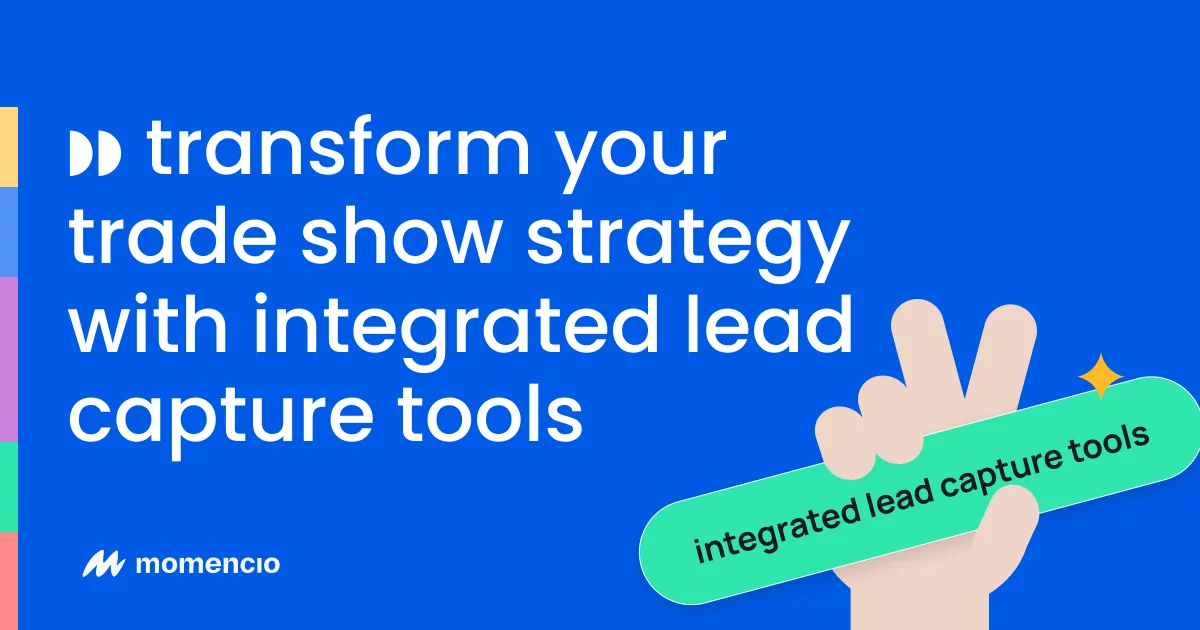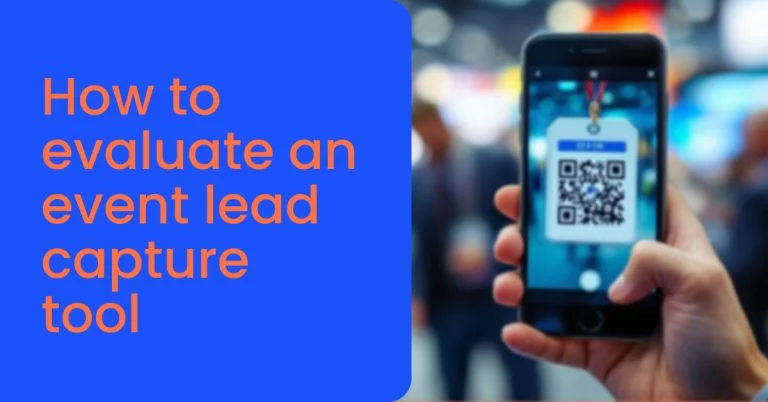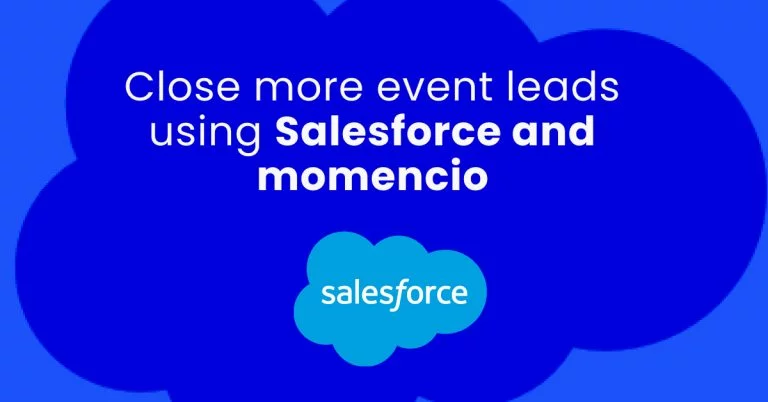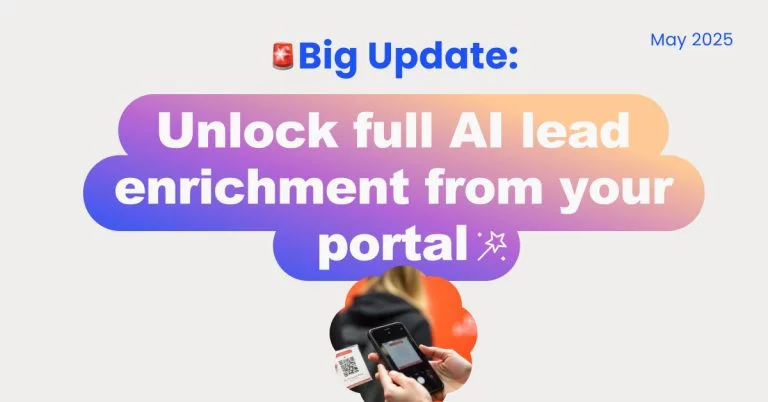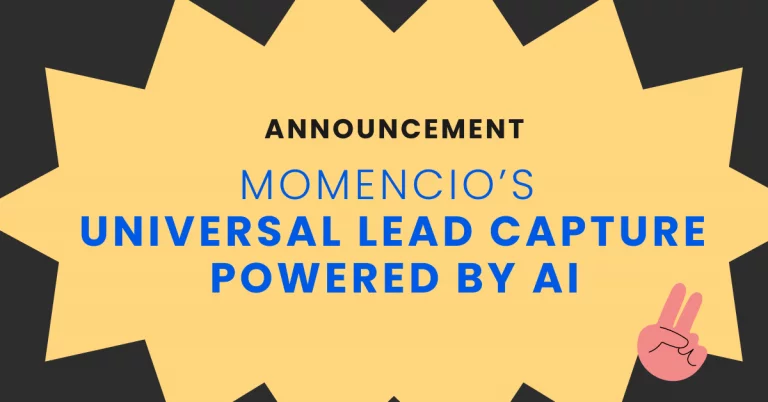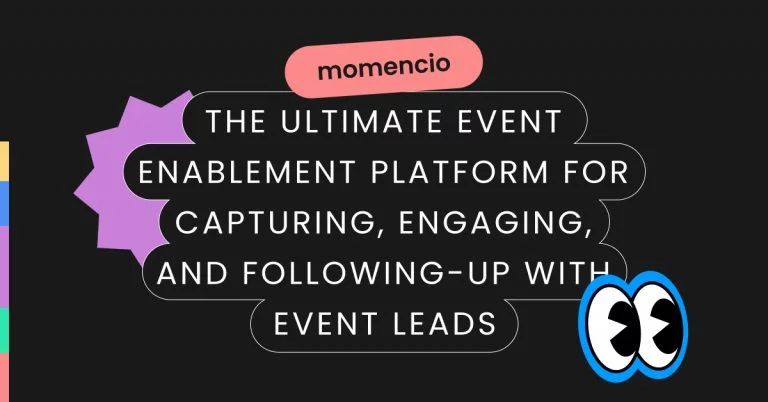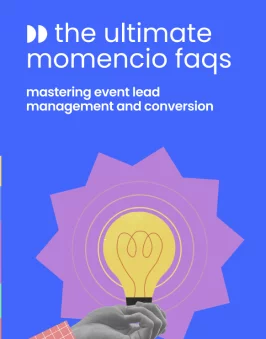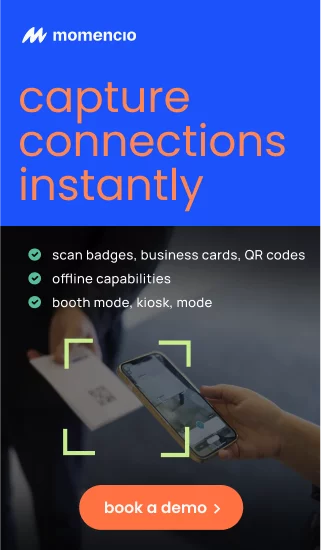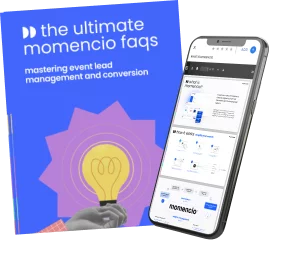Capturing leads effectively is not just about collecting business cards but about seamlessly integrating this information into your sales process. Integrated lead capture tools have become essential in this digital age, offering a more streamlined, efficient way to gather, analyze, and act on lead data in real time. This technology not only simplifies the capture process but also enhances the quality of the interactions and the speed of follow-up actions.
Recent studies indicate that companies using integrated solutions for lead capture at trade shows report a 30% higher conversion rate compared to those using traditional methods. This statistic highlights the critical role of technology in maximizing the potential of every interaction during such events.
In this article, we will explore what integration means in the context of lead capture tools, how these tools can significantly improve your trade show strategies and outcomes, and the extensive benefits of syncing lead capture systems directly with Customer Relationship Management (CRM) systems. By the end, you will understand why integrating your lead capture process with your CRM is not just a luxury but a necessity in optimizing trade show ROI.
Understanding Integrated Lead Capture Tools
Integrated lead capture tools are advanced technological solutions designed to streamline the process of gathering and managing lead information during trade shows and similar events. These tools go beyond mere data collection; they integrate directly with other business systems, particularly CRM platforms, to automate and enhance the flow of information from initial contact to follow-up stages.
What are Integrated Lead Capture Tools?
At their core, integrated lead capture tools are systems that utilize software and hardware to collect data from potential leads at points of contact automatically. This can include digital scanners for business cards, mobile apps that sync data instantly, or interactive kiosks that engage users while collecting their details. The “integrated” aspect refers to how these tools connect in real-time to other business systems, especially CRM software, to input and update lead data without manual intervention immediately.
These tools typically feature:
- Automatic data capture: Scanning devices or apps capture lead information instantly.
- Real-time synchronization: Data is automatically synced with a CRM system, ensuring immediate access and follow-up.
- Enhanced data quality: Intelligent software can clean and enrich lead data, adding additional information available from online resources.
- Analytics capabilities: Integrated tools often provide analytics on the captured data, allowing businesses to assess the quality of leads and the effectiveness of the event in real time.
Differentiation from Traditional Methods
Traditional lead capture often involves collecting business cards or filling out forms, which are later manually entered into a CRM system. This process is not only time-consuming but also prone to errors and delays, which can significantly impede the lead follow-up process.
Integrated lead capture tools automate these processes, reducing the risk of errors and increasing the speed with which leads can be contacted after an event. The integration with CRM systems allows for immediate automated follow-ups, such as sending personalized emails or messages right after the lead is captured. This prompt response can significantly enhance the lead’s experience and increase the chances of converting them into a customer.
Additionally, these tools can track interactions at the event, providing valuable insights into which products or presentations attracted the most interest. This information can be used to tailor follow-up communications and improve future event strategies.
In summary, integrated lead capture tools represent a significant advancement over traditional methods. They not only improve efficiency and data accuracy but also enhance the strategic value of trade show participation by providing immediate insights and integration with broader marketing and sales activities. This seamless connectivity ensures that no potential lead falls through the cracks, maximizing the ROI from each event.
The Advantages of Integration at Trade Shows
Integrating lead capture tools into trade show strategies offers numerous advantages that can dramatically improve both the efficiency and effectiveness of your event participation. These benefits span from operational efficiencies to strategic enhancements, ensuring that every lead captured is maximized to its full potential.
Streamlining Data Capture and Management
The primary advantage of integrated lead capture tools is their ability to streamline the process of collecting and managing lead information. This integration eliminates the need for manual data entry, which is often prone to errors and can be incredibly time-consuming. With tools like digital badge scanners or mobile lead capture apps, information is instantly transferred into a CRM system, making it immediately accessible to sales and marketing teams.
This immediate data capture and synchronization mean that leads are fresher and more accurate, which significantly improves the likelihood of successful follow-up. Moreover, because the data is directly integrated into CRM systems, it can be quickly segmented, analyzed, and acted upon, aligning with ongoing sales processes and campaigns without delay.
Enhancing Real-Time Lead Engagement and Follow-Up
One of the critical elements of successful trade show marketing is the ability to engage leads promptly and effectively. Integrated lead capture tools enhance this capability by allowing for real-time engagement. As soon as a lead’s information is captured and entered into the system, automated workflows can trigger personalized follow-up actions, such as sending tailored emails or SMS messages that reflect the conversation or interest shown at the booth.
This immediate follow-up helps keep your brand top-of-mind for the lead, capitalizing on the initial interest and momentum generated at the event. Furthermore, integration with CRM systems allows these interactions to be tracked and refined based on the lead’s response, enabling a more dynamic and responsive engagement strategy.
Leveraging Data for Strategic Insights
Beyond the operational efficiencies, integrated lead capture tools provide strategic advantages by offering deeper insights into lead behavior and preferences. With advanced analytics integrated into these tools, companies can immediately see which products, services, or presentations are drawing the most interest at the trade show. This real-time data can inform not only immediate follow-up strategies but also broader marketing and product development strategies.
These analytics can also help in evaluating the overall success of the trade show, providing data-driven insights into how well different aspects of the event performed in terms of lead engagement and conversion. This makes it easier to justify the ROI of event participation to stakeholders and to make informed decisions about future event investments.
CRM Integration: Transforming Leads into Sales
Integrating lead capture tools with Customer Relationship Management (CRM) systems is pivotal in transforming trade show leads into viable sales opportunities. This seamless connectivity ensures that every piece of data captured is immediately actionable, enhancing both the efficiency and effectiveness of post-event follow-up strategies.
The Role of CRM in Lead Capture
CRM systems are designed to manage and analyze customer interactions and data throughout the customer lifecycle. By integrating lead capture tools directly with CRM systems, businesses can automate the transfer of lead data collected at trade shows into their central sales and marketing systems. This integration provides several benefits:
- Immediate Data Availability: As soon as lead data is captured, it’s available in the CRM for sales teams to access and act upon. This rapid availability is crucial for timely follow-ups, especially in competitive trade show environments where the first contact post-event can make a significant difference.
- Enhanced Lead Segmentation: CRM systems allow for detailed segmentation based on the data captured, enabling more personalized follow-up strategies. This can include segmenting leads by interest shown in specific products and industries or even based on conversations held during the event.
- Streamlined Follow-Up Processes: With CRM integration, follow-up processes can be automated based on predefined criteria. For example, leads showing high interest can automatically receive more immediate and detailed follow-up communications compared to those with general inquiries.
Case Examples of Successful CRM Integrations (Hypothetical Scenarios)
Scenario 1: High-Tech Gadgets Trade Show
- Situation: A tech company introduces a new smart home device at a trade show and uses integrated lead capture tools to collect visitor information.
- Action: The lead data is automatically segmented in their CRM based on the interest level indicated during interactions. High-interest leads receive an immediate follow-up email with a special demo video and an invitation for a one-on-one consultation.
- Result: The company sees a 40% increase in follow-up engagement and a 25% conversion rate from lead to a sale, attributed directly to the speed and personalization of their follow-up efforts.
Scenario 2: Healthcare Solutions Conference
- Situation: A healthcare solutions provider participates in a conference, using an integrated lead capture system to gather contacts.
- Action: The CRM integration allows for immediate scheduling of follow-up appointments and personalized content delivery based on specific challenges discussed at the event.
- Result: Post-event analysis shows a 50% higher retention of lead interest and a 30% improvement in conversion rates compared to previous events without integrated systems.
These scenarios underscore how CRM integration can not only speed up the lead management process but also significantly enhance the effectiveness of converting trade show leads into sales. By ensuring that lead data is not just collected but actively and intelligently utilized, businesses can optimize their event investments and achieve better sales outcomes.
Integrating lead capture tools with CRM systems is a critical strategy for any business looking to enhance its trade show performance. This integration provides a competitive edge by enabling more targeted, efficient, and effective marketing and sales processes. Ultimately, it’s about ensuring that no opportunity is lost — every lead captured at a trade show is a potential customer, and CRM integration ensures that this potential is fully realized.
Implementing Integrated Tools for Maximum Impact
Implementing integrated lead capture tools effectively is crucial for maximizing their impact at trade shows and other events. This process involves careful planning, selection of the right technology, and training of personnel. Below, we delve into a step-by-step guide to ensure successful integration and highlight best practices for utilizing these tools to their fullest potential.
Step-by-Step Guide on Integrating These Tools into Your Trade Show Strategy
- Evaluate Your Needs and Goals: Begin by assessing what you hope to achieve with integrated lead capture tools. Consider your current pain points in lead management and how integration can address these issues. This step should align with broader marketing and sales objectives.
- Choose the Right Tools: Select tools that best fit your specific needs. Consider factors like compatibility with existing CRM systems, ease of use, data capture capabilities, and real-time analytics features. It’s also essential to consider vendor support and community reviews during the selection process.
- Plan for Integration: Coordinate with IT and CRM administrators to ensure that the new tools can integrate seamlessly with your existing systems. This might involve custom API integrations or the use of middleware solutions that bridge different technologies.
- Pilot Testing: Before fully deploying the tool at a large-scale event, conduct pilot tests at smaller gatherings or within controlled environments. This testing phase will help identify any technical issues and allow you to make necessary adjustments.
- Staff Training: Ensure that all users, especially sales and marketing teams, are adequately trained on how to use the tools. This training should cover essential operations, data entry standards, and how to access and interpret the data collected.
- Deployment: Implement the tools during your trade shows and monitor their usage closely. It’s crucial to have IT support on hand during the initial deployment phase to address any real-time issues that may arise.
- Collect Feedback and Iterate: After the event, gather feedback from users and analyze the data captured to assess the effectiveness of the tools. Use this information to refine your approach, making necessary adjustments to the tools or your strategy for future events.
Best Practices for Deployment and Training
- Integrate Early: Incorporate the tools into your event planning as early as possible. This integration allows for adequate time to test and adjust the system as needed before going live.
- Focus on User Experience: Choose tools that offer a good user experience. Simplicity in design and ease of use are crucial to ensure high adoption rates among team members.
- Consistent Updates and Maintenance: Keep the software updated with the latest patches and releases from the vendor. Regular maintenance ensures that the system remains efficient and secure.
- Leverage Analytics: Make full use of the analytics capabilities of your lead capture tools. These insights can drive more informed marketing decisions and help tailor follow-up communications effectively.
- Encourage Team Feedback: Involve your team in the feedback process. Their firsthand experiences can provide valuable insights into what works and what doesn’t, leading to continuous improvement.
- Document Processes: Maintain detailed documentation of all processes related to the use of integrated tools. This documentation will be invaluable for training new staff and refining the use of technology over time.
Successfully implementing integrated lead capture tools requires a comprehensive approach that includes careful planning, selection, testing, and ongoing management. By following these steps and best practices, organizations can ensure that they fully capitalize on the advantages of integration, leading to improved lead management and enhanced ROI from their event activities.
Analyzing the Outcomes: How Integration Boosts ROI
After implementing integrated lead capture tools at trade shows and events, it’s crucial to measure and analyze the outcomes to understand the return on investment (ROI) these technologies provide. This analysis not only validates the effectiveness of the tools but also helps refine strategies for future events.
Data-driven Insights on Improved Outcomes
The integration of lead capture tools with CRM systems provides a wealth of data that can be used to generate insightful analytics. These insights include:
- Lead Conversion Rates: Tracking how many captured leads convert into sales is the most direct indicator of the success of your integration efforts. Enhanced data quality and immediate follow-up capabilities generally increase conversion rates.
- Lead Quality: Integrated tools help improve the quality of the data collected, allowing for more accurate scoring and prioritization of leads. Higher quality leads often translate into more efficient sales processes and better allocation of resources.
- Engagement Metrics: Analyze how engaged your leads were at the event. Metrics such as time spent at your booth, interactions with displays or presentations, and requests for follow-up can indicate the effectiveness of your engagement strategies.
- Speed of Follow-Up: Integration speeds up the process of following up with leads. Measuring the time from lead capture first to contact post-event can help assess how well your CRM integration is functioning.
Comparative Analysis with Non-Integrated Systems
To truly understand the impact of integration, it’s beneficial to compare outcomes with previous events where non-integrated systems were used. Key areas of comparison might include:
- Efficiency Improvements: Compare the time and resources previously spent on manual data entry and lead follow-up versus the automated processes enabled by integration. Efficiency gains often lead to cost savings and allow staff to focus on higher-value activities.
- Increase in Lead Volume and Quality: Evaluate whether integrated tools have led to the rise in the volume of leads captured and whether these leads are of higher quality based on conversion rates and engagement.
- ROI from Events: Assess the overall return on investment by comparing the total costs of the event (including technology investments) against the revenue generated from leads captured at the event.
Leveraging Insights for Future Strategy
The data collected and analyzed by using integrated lead capture tools should inform your future event strategies and technology investments. Critical strategic decisions might include:
- Optimizing Lead Engagement Techniques: If data shows that specific engagement strategies are more effective, these can be prioritized and enhanced for future events.
- Technology Adjustments: Based on feedback and performance, adjustments might be necessary either in the choice of technology or its implementation.
- Training and Processes: Continuous improvement in how teams use the tools can be achieved by refining training processes and documentation based on lessons learned.
Analyzing the outcomes of integrating lead capture tools into your event strategies provides crucial insights that can dramatically improve both the immediate and long-term returns on investment. These insights not only justify the initial technology expenditure but also guide strategic decisions that enhance the effectiveness of future event participation. By continuously measuring, analyzing, and adapting based on data-driven insights, organizations can ensure they are getting the maximum value from their event technology investments.
Conclusion
The integration of lead capture tools with CRM systems at trade shows and other events represents a transformative shift in how businesses manage and nurture leads. By automating the data capture process and ensuring real-time, seamless updates to CRM systems, companies can engage leads more effectively, accelerate the sales process, and enhance overall event ROI. This technology not only streamlines operations but also provides strategic advantages by offering more profound insights into lead behavior and preferences, which are critical for tailoring follow-up actions and refining marketing strategies.
The advantages of implementing integrated lead capture tools are clear: improved data accuracy, increased efficiency in lead management, enhanced lead engagement through timely follow-ups, and more informed decision-making through data-driven insights. These benefits collectively contribute to a higher conversion rate of leads into paying customers, ultimately boosting the bottom line.
If you’re looking to elevate your trade show performance and turn every lead into a potential business opportunity, consider integrating your lead capture processes with a CRM system. Tools like those offered by momencio not only streamline your lead management but also enhance your engagement strategies, ensuring that every lead is included.
Take the first step towards transforming your trade show results by exploring momencio‘s advanced event technology solutions. With momencio, you can ensure that every interaction at your booth is captured, analyzed, and followed up on, maximizing the potential of each lead. Contact our sales team to book a demo and see how momencio can revolutionize your event marketing strategy and lead management process. Take advantage of the opportunity to turn every event into a success story.
FAQs: Integrated Lead Capture Tools
- What are integrated lead capture tools?
- Integrated lead capture tools are systems that automate the collection and management of lead data at events like trade shows. They seamlessly sync this information with CRM systems, enabling real-time lead management and follow-up processes.
- How do integrated lead capture tools differ from traditional methods?
- Unlike traditional methods that often involve manual entry of data collected from business cards or forms, integrated tools automate data capture and entry, reducing errors, saving time, and enhancing lead quality.
- How do these tools improve lead management at trade shows?
- By automating data capture and integration with CRM systems, these tools ensure that lead information is quickly and accurately processed. This allows for timely and personalized follow-up, improving the chances of converting leads into sales.
- Can integrated lead capture tools work with any CRM system?
- Most modern integrated lead capture tools are designed to be compatible with a wide range of CRM systems. However, it’s essential to verify compatibility with your specific CRM to ensure seamless functionality.
- What are the key features to look for in integrated lead capture tools?
- Key features include automatic data capture, real-time synchronization with CRM, data enrichment capabilities, and analytics for measuring engagement and effectiveness.
- How do these tools affect the speed of follow-up with leads?
- Are integrated lead capture tools cost-effective?
- While there is an upfront investment involved, the efficiency gains, improved lead quality, and higher conversion rates often result in a strong ROI, making these tools cost-effective in the long run.
- How can businesses measure the success of using integrated lead capture tools?
- What training is required for staff to use these tools effectively?
- How do integrated lead capture tools fit into a broader event marketing strategy?
- These tools are a vital component of a modern event marketing strategy, enabling businesses to capture, manage more effectively, and nurture leads generated at events, aligning with broader marketing goals of conversion and customer engagement more effectively.
Interesting Facts from Research on Integrated Lead Capture Tools
- Increased Engagement: Companies using integrated lead capture tools see an average increase of 50% in lead engagement during follow-up compared to those using traditional methods.
- Conversion Rates: Businesses that integrate lead capture with their CRM systems report an average increase of 35% in conversion rates from leads collected at trade shows.
- Speed of Follow-Up: Data shows that the average time to first contact with a lead drops from 48 hours to less than 5 hours when using integrated tools, significantly impacting lead conversion success.
- Data Accuracy: Integrated lead capture tools have been shown to improve data accuracy by up to 90%, reducing the common issues associated with manual data entry.
- ROI Enhancement: On average, companies using integrated lead capture systems at trade shows report a 27% higher ROI compared to those using non-integrated systems.
- Adoption Rates: Adoption rates of integrated lead capture technologies have surged by over 60% in the past two years as companies recognize the benefits of real-time data capture and analysis.
- Lead Volume: Organizations utilizing these tools often experience a 40% increase in the volume of leads captured at events, demonstrating the efficiency and effectiveness of automated systems.
- Lead Quality: Surveys indicate that 75% of marketing professionals believe that leads captured via integrated tools are of higher quality because of the additional data enrichment features.
- Market Trends: The market for integrated lead capture solutions is projected to grow by 20% annually over the next five years, driven by increasing demand for automation and efficient lead management practices.
- Customer Retention: Companies that effectively integrate lead capture with CRM report a 25% higher customer retention rate, thanks to more personalized and timely follow-up strategies.
